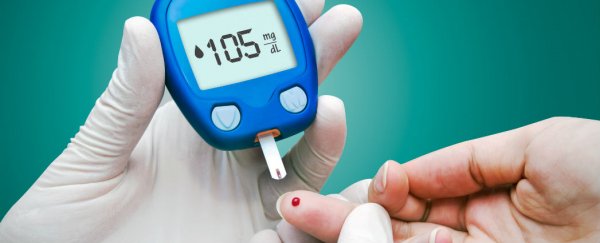Researchers in the US have developed a new type of insulin that's injected once a day into the blood-stream, and then is automatically activated only when a person's blood sugar levels are high enough. This means a type 1 diabetes patient doesn't need to worry about keep tabs on their condition throughout the day, because the 'smart' insulin has got it covered.
The new compound, called Ins-PBA-F, was developed by researchers at the University of Utah and the Massachusetts Institute of Technology (MIT), and has so far shown very positive outcomes in diabetic mice. The team was able to ensure that it remained in the blood stream for 24 hours by adding a molecule known as an aliphatic domain, which is made up of a long chain of fatty acids that dangle from the insulin molecule. This chain, the researchers think, links to a blood protein called albumin, which allows the insulin to be stored safely, without the risk of it accidentally linking to other sugar molecules in the blood.
And there it sits, until blood sugar levels hit a critical threshold, which causes it to be released so it can lower the amount of glucose back to safe levels. The team also added a chemical called PBA (Phenylboronic Acid) to their new insulin, which can not only attach to glucose molecules, but also detach again once the job is done.
Publishing in the journal Proceedings of the National Academies of Science, the researchers report that when treated with the new insulin compound once a day, the diabetic mice were able to maintain glucose levels as stable as their healthy, non-diabetic peers, without having to do anything. (Which is just as well, because mice aren't exactly great at applying their own insulin shots.)
"The real challenge is getting the right amount of insulin available when you need it, because if you have too little insulin your blood sugar goes up, and if you have too much, it can go dangerously low," one of the team, Daniel Anderson from MIT's Department of Chemical Engineering, told Anne Trafton at MIT News. "Currently available insulins act independent of the sugar levels in the patient."
If this treatment makes it to the market, it will relieve the constant stress of maintaining blood sugar levels, and the risks of something going wrong if a diabetic gets their insulin does wrong. According to Hannah Devlin at The Guardian, 10 percent of deaths in type 1 diabetics are caused by taking too much insulin, which causes blood sugar levels too dip so slow, it can lead to hypoglycaemia. And on the other hand, if a person isn't giving themselves enough insulin, their blood sugar levels will remain too high, which could lead to blindness and nerve damage.
"In theory, with this there would be none of these glucose problems," Chou told The Guardian.
The next step is to get the insulin ready for human trials, which the team expect will take between two and five years.
"It would be a breathtaking advance in diabetes treatment if the … technology could accomplish the translation of this idea into a routine treatment of diabetes," Michael Weiss, a professor of biochemistry and medicine at Case Western Reserve University in the US, who was not involved in the research, told MIT News.
This couldn't come fast enough.
Sources: The Guardian, MIT News
